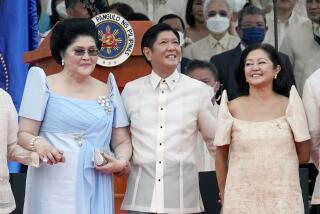Aquino Urged to Deal on Marcos Items
- Share via
WASHINGTON — The Reagan Administration hopes to encourage the government of Philippine President Corazon Aquino to reach an out-of-court settlement with Ferdinand E. Marcos over the ownership of the cash, jewels and documents that the deposed dictator and his entourage took with them to Honolulu, U.S. officials said Friday.
The officials, speaking on condition that they not be identified, said such a negotiated settlement would spare the U.S. government the unpalatable task of either offending the new Aquino government or undercutting its commitment to give Marcos “safe haven.”
The officials would not detail the arguments that the Administration would advance to bring the two sides together and emphasized that no attempt would be made until the Customs Service completes an item-by-item inventory of what Marcos and his party took out of the Philippines.
If the attempt to negotiate a settlement fails, the U.S. role as interpleader--a party that has possession of sought-after material but no legal interest in it--would be continued before the courts, the officials said.
“This is a classic interpleader situation,” one Justice Department source said.
Paper Work Readied
However, while advocating an out-of-court settlement, the Administration readied the paper work that would permit the Manila government to press its claim to ownership of the millions of dollars worth of “baggage” that Marcos and his party crammed into a U.S. Air Force C-141 cargo jet before they fled into exile.
State Department spokesman Bernard Kalb said the Customs Service will give the Aquino government a full inventory of the disputed property as soon as the list is completed. It was the first time the U.S. government had agreed to supply all of the information sought by the Aquino government.
Philippine government attorneys need that information to prepare lawsuits to recover the cash and jewels. Sources close to the case also believe that some of the documents carried on the C-141 probably will help the Aquino government identify real estate and other investments that Marcos and his family control in the United States.
Marcos and the 88 family members and aides who accompanied him traveled from Manila to Hickam Air Force Base in Honolulu by way of Guam in a C-141. Another giant cargo plane carried about 300 boxes of property. The Customs Service impounded the contents of the baggage plane pending a legal determination of its ownership.
Peso Inventory Released
In court action in Honolulu on Friday, the Aquino government won release of a Customs Service inventory showing that the federal agency is holding 28,207,326 Philippine pesos from that impounded baggage. At the current exchange rate of 20 pesos to the dollar, the currency is worth about $1.41 million.
Most of the money--$1.39 million worth--is contained in 22 cardboard boxes, according to an affidavit by George Roberts, Customs director in Hawaii, filed Friday in U.S. District Court. Most of the currency was in packets of 100-peso bills, while some was in 5-, 10-, 20-, and 50-peso bills, according to the affidavit.
Earlier Friday, U.S. District Judge Harold M. Fong denied a motion by attorneys representing Marcos asking the court to bar release of the currency inventory. Customs had agreed Monday to provide the information in response to a lawsuit filed by the new Philippine government, which is acting through the Central Bank of the Philippines to recover the currency.
C. Michael Hare, a Honolulu attorney representing the Philippine government, said that release of the currency inventory brings the government very close to being able to prove its right to the money, because Philippine law prohibits the unauthorized export of more than 500 pesos.
But Richard Hibey, a Washington attorney representing Marcos and 19 members of his family and entourage named in the case, said he will challenge the U.S. court’s jurisdiction on the grounds that the laws on which the Philippine government has built its case are not applicable.
Hare, while expressing pleasure at the court ruling and describing the inventory as “indispensable,” said he was disappointed that U.S. Customs had not provided the serial numbers of any of the bills.
He said that after receiving the inventory, he renewed his request for the numbers, or at least “random runs” of some of the serial numbers.
“The serial numbers will tell us when it was printed, and from when it was printed we can tell who was supposed to get it, and from who was supposed to get it we can tell how it got into the hands of ex-President Marcos,” Hare said.
Request Considered
John Peyton, an assistant U.S. attorney representing Customs, said the serial numbers were not provided because there was “no time to do it and no decision that we would do it even if we had the time.” Hare’s request for serial numbers is under consideration, he said.
According to statements by Sen. Paul Laxalt (R-Nev.), who spoke with Marcos about the boxes of pesos by telephone Monday, the former president “thought when he left Manila he’d be going home”--to Laoag in his home province of Ilocos Norte--”through Clark Air Base.”
“He said he never intended to take that money out of the Philippines,” Laxalt said.
Meanwhile, members of the Marcos party were told that if they want to continue shopping at the Hickam Air Force Base exchange, they will have to pay cash for anything they take. The “cash only” order was issued after members of the entourage ran up $40,000 in unpaid bills, a little more than $12,000 in Guam and the rest in Honolulu.
Times staff writer David Holley, in Honolulu, contributed to this article.
More to Read
Sign up for Essential California
The most important California stories and recommendations in your inbox every morning.
You may occasionally receive promotional content from the Los Angeles Times.









